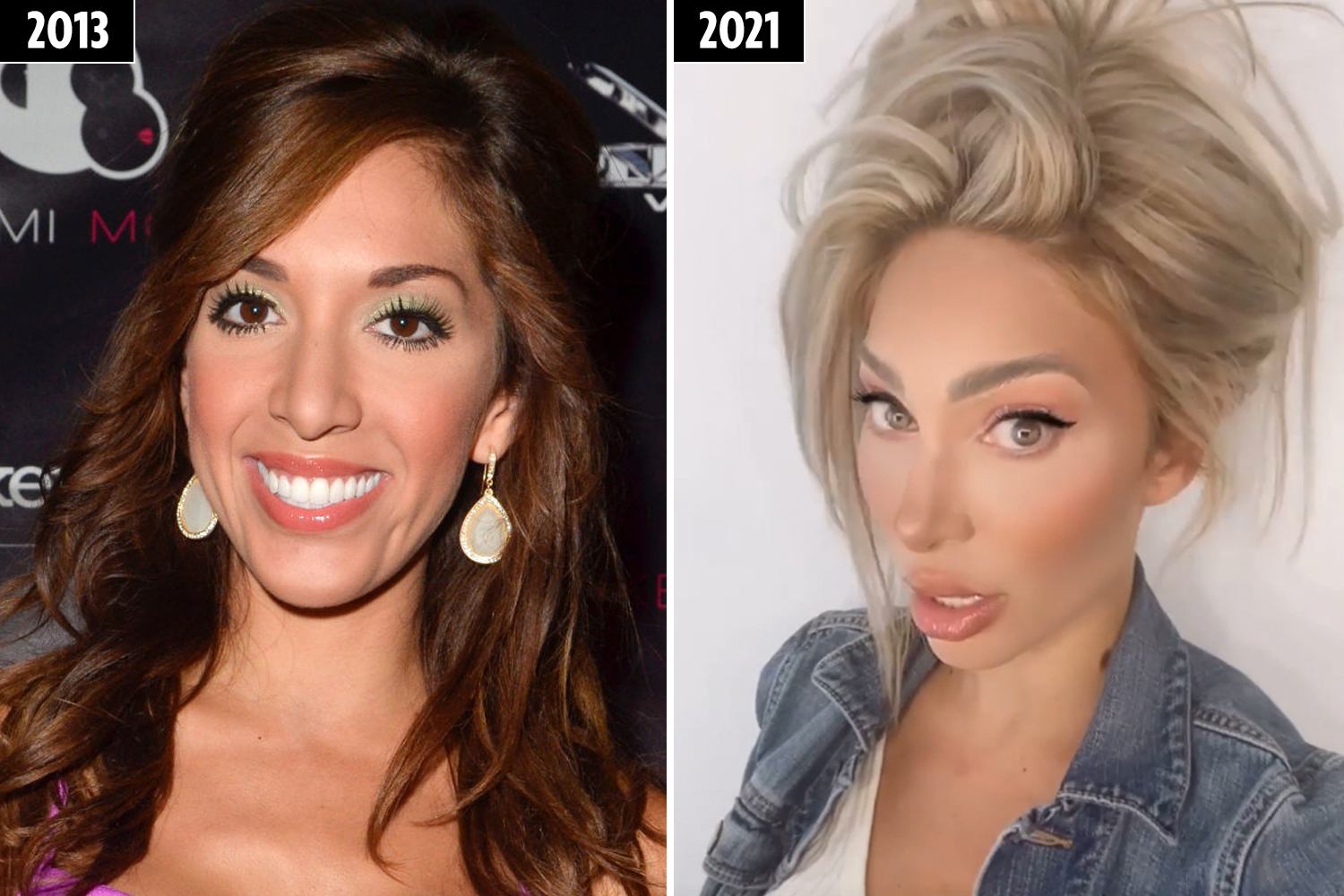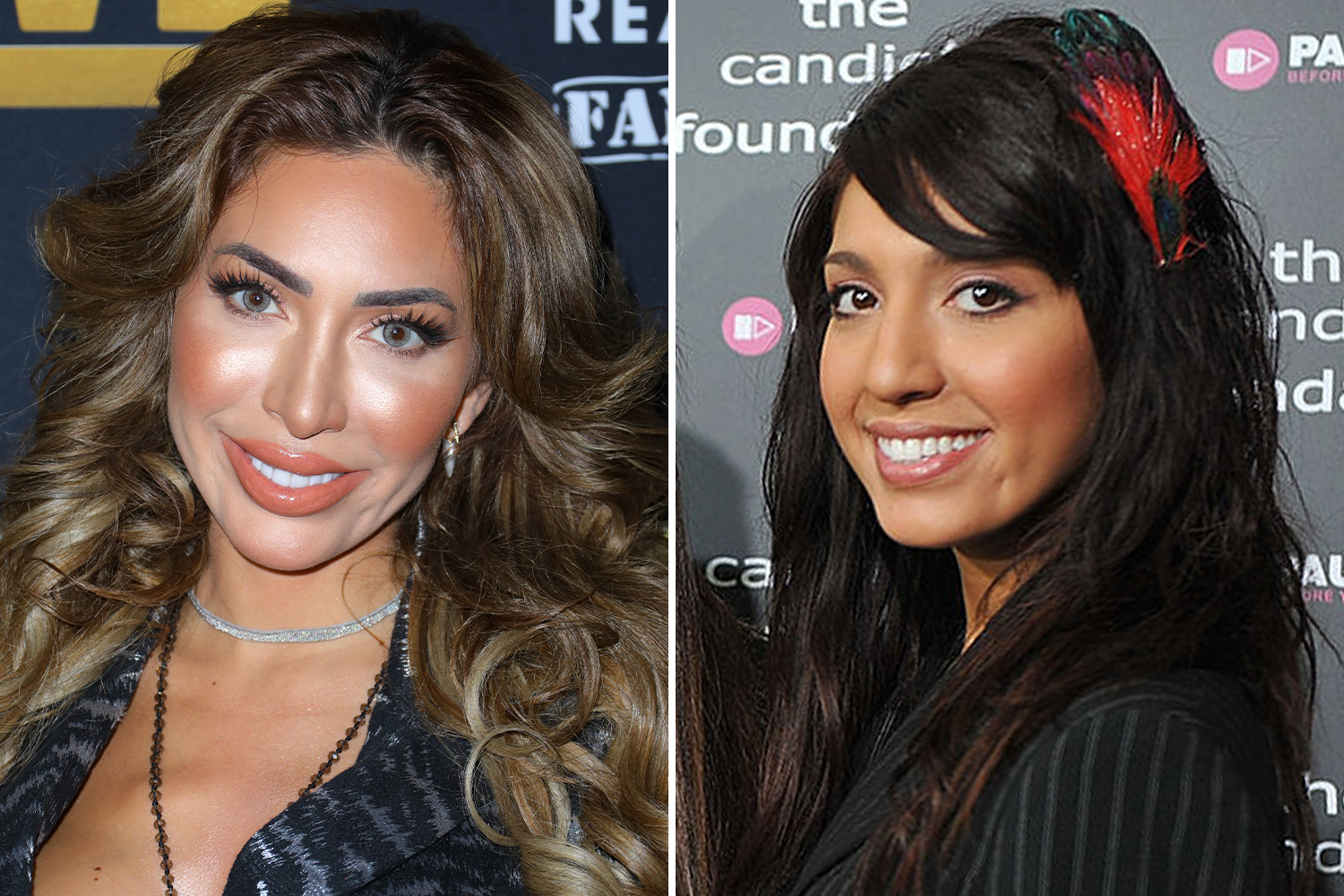Farrah Abraham's Plastic Surgery: Candid Confessions
The phrase "Farrah Abraham Gets Candid About Her Plastic" describes Farrah Abraham's open discussion about her cosmetic plastic surgery procedures. An example would be Abraham sharing her experiences, motivations, and recovery process in public interviews.
This topic is important because it sheds light on the prevalence and impact of cosmetic surgery in modern society. Discussing Abraham's experiences can raise awareness, encourage transparency, and provide insights into the decision-making process behind such procedures. Historically, cosmetic surgery has evolved from being inaccessible to becoming increasingly common, highlighting its growing significance in shaping cultural norms.
This article will explore Abraham's specific journey with cosmetic surgery, examining her motivations, the procedures she underwent, and her reflections on the overall experience.
Farrah Abraham Gets Candid About Her Plastic
The phrase "Farrah Abraham Gets Candid About Her Plastic" highlights the importance of various aspects related to cosmetic surgery, including:
- Personal motivations
- Types of procedures
- Recovery experiences
- Public perception
- Social implications
- Industry trends
- Ethical considerations
- Body image and self-esteem
Farrah Abraham's candid discussion about her plastic surgeries provides insights into these aspects, offering a unique perspective on the complex world of cosmetic enhancements. By sharing her experiences, she raises awareness, challenges societal norms, and encourages open dialogue about the motivations, consequences, and ethical implications of plastic surgery.
| Name | Birth Date | Birth Place | Net Worth |
|---|---|---|---|
| Farrah Abraham | May 31, 1991 | Omaha, Nebraska | $1 million |
Personal motivations
Farrah Abraham's candid discussion about her plastic surgeries sheds light on the personal motivations that drive individuals to undergo cosmetic enhancements. These motivations can be complex and varied, encompassing a range of psychological, social, and cultural factors.
- Self-esteem and body image: Many individuals seek plastic surgery to improve their self-esteem and body image. They may feel dissatisfied with certain physical characteristics and believe that surgery can help them achieve a more.
- Cultural and societal expectations: Cultural and societal norms can influence individuals' perceptions of beauty and desirability. In some cultures, certain physical attributes are highly valued and may lead to pressure to conform through plastic surgery.
- Media and celebrity influence: The media and celebrity culture often portray unattainable beauty standards that can create unrealistic expectations and drive individuals to seek plastic surgery to emulate their idols.
- Personal experiences and trauma: Personal experiences, such as traumatic events or accidents, can lead to physical disfigurement or dissatisfaction that individuals may seek to address through plastic surgery.
Understanding the personal motivations behind plastic surgery is crucial for addressing the ethical implications and potential consequences of these procedures. It highlights the need for individuals to carefully consider their reasons for undergoing surgery and to seek professional guidance to ensure informed decision-making.
Types of procedures
Farrah Abraham's candid discussion about her plastic surgeries brings to light the various types of procedures that individuals undergo to enhance their physical appearance. These procedures can range from minimally invasive to more complex surgeries, each with its own set of potential benefits, risks, and implications.
- Surgical procedures: These involve invasive techniques that require incisions and anesthesia. Surgical procedures can include breast augmentation, liposuction, rhinoplasty, and facelifts.
- Nonsurgical procedures: These are less invasive and do not require incisions or anesthesia. Nonsurgical procedures include Botox injections, dermal fillers, laser treatments, and chemical peels.
- Combination procedures: Some individuals opt for a combination of surgical and nonsurgical procedures to achieve their desired results. This approach allows for a more comprehensive transformation while addressing specific areas of concern.
- Revision procedures: In certain cases, individuals may undergo revision procedures to correct unsatisfactory results from previous surgeries or to address changes in their bodies over time.
The types of procedures that individuals choose depend on various factors, including their personal goals, budget, and risk tolerance. It is crucial for individuals to carefully research and consider the potential risks and benefits of each procedure before making a decision.
Recovery experiences
Recovery experiences, often overlooked in discussions about cosmetic surgery, play a significant role in shaping the overall journey of individuals who undergo these procedures. Farrah Abraham's candid insights into her own recovery experiences provide valuable perspectives on this crucial aspect.
- Physical recovery: The physical recovery process involves managing pain, swelling, and discomfort after surgery. It requires rest, wound care, and following specific instructions to ensure proper healing.
- Emotional recovery: Cosmetic surgery can trigger a range of emotions, including anxiety, excitement, and self-consciousness. Individuals may experience a rollercoaster of emotions as they adjust to their new appearance and navigate social interactions.
- Social recovery: Reintegrating into social life after cosmetic surgery can be challenging. Individuals may face scrutiny, judgment, or even rejection from others, which can impact their self-esteem and overall well-being.
- Long-term recovery: The long-term recovery process involves maintaining the results of surgery, addressing any complications, and adjusting to the aging process. It requires ongoing care, lifestyle changes, and realistic expectations.
Understanding the multifaceted nature of recovery experiences is essential for individuals considering cosmetic surgery. Farrah Abraham's candid account sheds light on the importance of preparing for the physical, emotional, social, and long-term aspects of recovery to ensure a well-rounded and positive experience.
Public perception
Public perception plays a significant role in shaping the experiences and outcomes of individuals who undergo cosmetic surgery. Farrah Abraham's decision to speak candidly about her plastic surgeries has sparked public discourse, highlighting various dimensions of public perception and its implications.
- Scrutiny and judgment: Public figures like Farrah Abraham often face intense scrutiny and judgment for their cosmetic surgery choices. This can lead to negative comments, criticism, and even cyberbullying, impacting their self-esteem and well-being.
- Influence on social norms: Celebrities and influencers have a significant influence on shaping societal norms around beauty and body image. Farrah Abraham's open discussion about her plastic surgeries can challenge traditional views and encourage others to embrace their own choices.
- Media portrayal and sensationalism: The media often sensationalizes stories about cosmetic surgery, focusing on extreme cases or negative outcomes. This can perpetuate unrealistic expectations and create a distorted perception of the prevalence and impact of plastic surgery.
- Lack of understanding and empathy: Some individuals may lack understanding or empathy towards those who undergo cosmetic surgery, viewing it as unnecessary or superficial. This can lead to insensitive comments or dismissive attitudes, further stigmatizing plastic surgery.
Farrah Abraham's candidness about her plastic surgeries has shed light on the complex interplay between personal choices, public perception, and societal norms. It emphasizes the need for open dialogue, empathy, and a balanced understanding of the motivations, risks, and potential benefits of cosmetic surgery.
Social implications
The social implications of Farrah Abraham's candid discussion about her plastic surgeries extend beyond personal experiences and encompass a broader societal context. Her openness sheds light on the complex interplay between individual choices, public perception, and prevailing cultural norms around beauty and body image.
- Challenging societal standards: Farrah Abraham's willingness to discuss her plastic surgeries challenges societal expectations and beauty standards. It encourages individuals to question traditional notions of attractiveness and empowers them to make choices that align with their own values and desires.
- Raising awareness and reducing stigma: By speaking openly about her experiences, Farrah Abraham helps reduce the stigma associated with plastic surgery and raises awareness about the motivations and decisions behind such procedures. This can lead to a more informed and nuanced public discourse on cosmetic enhancements.
- Promoting body positivity and self-acceptance: Farrah Abraham's journey can inspire others to embrace their own bodies and identities, regardless of whether or not they choose to undergo plastic surgery. Her candidness encourages self-acceptance and challenges the idea that external validation is necessary for self-worth.
- Sparking conversations about ethics and regulation: Farrah Abraham's experiences also spark conversations about the ethical implications and regulation of plastic surgery. Her openness highlights the need for informed decision-making, qualified practitioners, and appropriate safeguards to ensure the safety and well-being of individuals considering cosmetic procedures.
Farrah Abraham's candid discussion about her plastic surgeries has significant social implications, challenging societal norms, raising awareness, promoting body positivity, and sparking conversations about ethics and regulation. Her experiences underscore the complexity of cosmetic surgery and its impact on individuals and society as a whole.
Industry trends
Farrah Abraham's candid discussion about her plastic surgeries highlights the influence of industry trends on individual choices and experiences. The evolving landscape of cosmetic surgery, driven by technological advancements, cultural shifts, and consumer demands, has a significant impact on the decisions and outcomes of those considering these procedures.
One of the most notable industry trends is the rise of minimally invasive and non-surgical procedures. Farrah Abraham's own journey reflects this trend, as she has opted for non-surgical enhancements such as Botox injections and dermal fillers to achieve her desired results. These procedures are less invasive, involve shorter recovery times, and offer a more subtle and natural-looking transformation, appealing to a wider range of individuals.
Industry trends also shape the availability and accessibility of cosmetic surgery. The proliferation of cosmetic clinics and the increasing affordability of procedures have made them more accessible to the general public. This has led to a wider acceptance and normalization of cosmetic enhancements, as evidenced by Farrah Abraham's openness about her experiences.
Understanding the connection between industry trends and "Farrah Abraham Gets Candid About Her Plastic" provides valuable insights into the factors that influence individual choices and experiences. It highlights the need for informed decision-making, realistic expectations, and a balanced understanding of the potential benefits and risks associated with cosmetic surgery.
Ethical considerations
Examining the connection between "Ethical considerations" and "Farrah Abraham Gets Candid About Her Plastic" reveals the complex interplay between personal choices, public perception, and societal norms surrounding cosmetic surgery. Ethical considerations serve as a critical component of Farrah Abraham's candid discussion, as they raise important questions about the motivations, risks, and potential consequences of cosmetic enhancements.
Farrah Abraham's openness about her plastic surgeries has sparked a dialogue on the ethical implications of these procedures. By sharing her experiences, she highlights the need for individuals to carefully weigh the potential benefits and risks before making decisions about altering their appearance. Ethical considerations encompass issues such as informed consent, patient safety, and the potential for exploitation or coercion in the cosmetic surgery industry.
Farrah Abraham's candidness has also shed light on the role of media and celebrity culture in shaping public perception of cosmetic surgery. Her willingness to discuss her experiences challenges traditional notions of beauty and encourages a more nuanced understanding of the factors that influence individuals' decisions to undergo these procedures. By bringing ethical considerations to the forefront, Farrah Abraham's discussion contributes to a more informed and responsible public discourse on cosmetic surgery.
Body image and self-esteem
The exploration of "Farrah Abraham Gets Candid About Her Plastic" reveals a deep connection to "Body image and self-esteem." Farrah Abraham's candid discussion about her cosmetic surgeries sheds light on the complex interplay between an individual's perception of their physical appearance and their overall well-being.
Body image refers to an individual's subjective perception of their own physical appearance, while self-esteem encompasses their overall sense of worth and value. These two concepts are closely intertwined, as body image can significantly influence self-esteem. When individuals are dissatisfied with their physical appearance, it can lead to low self-esteem and negative self-perceptions.
Farrah Abraham's decision to undergo plastic surgeries can be seen as an attempt to improve her body image and boost her self-esteem. By altering her physical appearance, she aimed to achieve a more idealized version of herself, one that aligned with societal beauty standards. This is a common motivation for cosmetic surgery, as many individuals believe that enhancing their physical appearance will lead to increased self-confidence and happiness.
However, it is important to note that cosmetic surgery alone cannot guarantee improved body image and self-esteem. Research suggests that the relationship between the two is complex and multifaceted. While some individuals may experience positive outcomes, others may find that their body image and self-esteem remain unchanged or even worsen after surgery. Therefore, it is crucial for individuals considering cosmetic surgery to have realistic expectations and to understand the potential psychological implications.
In exploring "Farrah Abraham Gets Candid About Her Plastic," this article has shed light on several key themes and ideas. Firstly, it highlights the complex interplay between personal motivations, public perception, and societal norms surrounding cosmetic surgery. Farrah Abraham's candid discussion about her experiences challenges traditional beauty standards and encourages a more nuanced understanding of the factors influencing individuals' decisions to undergo these procedures.
Secondly, the article delves into the ethical considerations associated with cosmetic surgery, raising questions about informed consent, patient safety, and the potential for exploitation. Farrah Abraham's openness has sparked a dialogue on the need for responsible practices and informed decision-making in the cosmetic surgery industry.
Finally, the exploration of "Farrah Abraham Gets Candid About Her Plastic" reveals the intricate connection between body image, self-esteem, and cosmetic surgery. While some individuals may experience improved body image and self-confidence after surgery, it is crucial to recognize that the relationship between these factors is complex and multifaceted. Realistic expectations and a comprehensive understanding of the potential psychological implications are essential for anyone considering cosmetic surgery.
Farrah Abraham's candid discussion about her plastic surgeries serves as a catalyst for broader conversations about the ethical, social, and personal implications of cosmetic enhancements. It challenges us to critically examine societal beauty standards, prioritize informed decision-making, and foster a culture of body positivity and self-acceptance.
America thayer crime scene photos death video
Shadab khan wife net worth height parents
Frankie valli net worth 2024 how much

From 'Teen Mom' to BestSelling Author! See Farrah Abraham's Transformation

How Teen Mom Farrah Abraham has spent 133K transforming her body

Teen Mom Farrah Abraham reveals the one plastic surgery regret that
ncG1vNJzZmiaopaxsLLLomWsnp9ne6W1xqKrmqSfmLKiutKpmJydo2OwsLmOn5irqpGdeqKu0ZqfmqVdnLK1v4ycmKecmZl6oq7OrqtmoJWnerG4wKyroptencGuuA%3D%3D